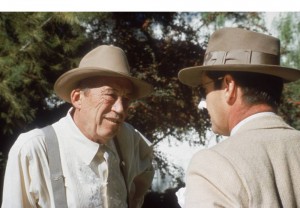

By Mike Wilmington Wilmington@moviecitynews.com
Wilmington on DVDs. Chinatown.
Chinatown (Four Stars)
U.S.; Roman Polanski, 1974 (Paramount)

“Forget it Jake. It’s Chinatown.”
Those are the last words — chilling, evocative, wised up — of Roman Polanski and Robert Towne’s Chinatown — that great dark tale of politics, murder, and family secrets in ‘30s Los Angeles. No matter what you think of Polanski and his arrest and extradition problems — and I bet they’re more complex than most of the cut-and-dried “He’s persecuted” or “He’s a fugitive schmuck” analyses offered by friends or foes — the director’s 1974 private eye movie classic Chinatown is still some kind of masterpiece of neo-noir.
The movie, one of the big commercial-critical hits of its era, was a career peak for director Polanski, the matchless screenwriter Towne, and the superb star team of Jack Nicholson, Faye Dunaway and John Huston.
It‘s a picture that seems close to perfect of its kind and one of the ‘70s films I love best. Gorgeous and terrifying and sometimes funny as hell, Chinatown tells a romantic/tragic/murder mystery tale of official crimes and personal corruption raging around the real-life L. A. Water scandal, with private sin and public swindles steadily stripped bare by J. J. Gittes (one of Jack Nicholson‘s signature roles), a cynical, natty, smart-ass Hammetesque shamus, with a nose for corruption and a hot-trigger temper.
Gittes is an anti-Philip Marlowe detective. He’s proud of taking divorce cases (Marlowe disdained them), and he’s not too queasy about selling out. He’s also much less sexually reticent than Raymond Chandler’s pipe-smoking knight of the mean streets — though he cracks just as wise. Fundamentally, Gittes is a survivor. He likes his nose, he likes breathing through it, but he finds it increasingly hard to keep it unbloodied and out of rich L. A. people’s business as he keeps digging deeper into what starts as a simple infidelity investigation and then broadens to include a vast conspiracy, intertwined with the deadly history of immaculately evil nabob Noah Cross (played by the devilishly genial Huston) and his desperate, wounded daughter Evelyn Mulwray (Dunaway) — a nasty web that includes Polanski himself as the cocky little fedora-topped Cross torpedo (with a Polish accent) who calls Gittes “Kitty-Kat” and slices up his proboscis for a memento mori.
Chinatown — with splendid Richard Sylbert production design, gleaming John Alonso cinematography and a really haunting Jerry Goldsmith score — wafts us back to L. A., downtown and Silverlake in the ‘30s: the era of the Depression and jazzman Bunny Berigan‘s sardonic lament “I Can‘t Get Started.” It was also the heyday, of course, of the hard-boiled, lean and mean “Black Mask” style thrillers of Dashiell Hammett and Chandler, hard-boiled, high-style fiction that Towne, at his absolute best, pastiches to a fine turn and that Polanski, at his best ( the championship form of Cul-de-Sac and The Pianist) makes come shatteringly alive.
The movie has great dialogue, great acting, great direction, and an unmatchable blend of wised-up savvy and yearning romanticism. The bleak ending (Polanski‘s idea) cuts you to the heart. Temper tantrum virtuoso Nicholson has some of his best blowups. And The supporting cast — Polanski, Burt Young, Diane Ladd, Perry Lopez, Dick Bakalyan, Roy Jenson, James Hong, Bruce Glover, Joe Mantell and John Hillerman (at his smarmiest) — are pretty damned wonderful too.
 In fact, this is a movie that — not counting Gittes’ slit nose — has no perceptible flaws: a classic you won’t, can’t, never will, ever forget. Chinatown reminds you of how jack Nicholson single-handedly almost, shifted the ground of the movies, and changed our conception of what a movie star was, in the early ’70s. It reminds you of how vulnerable faye Dunaway ciould be, of what a sly old movie fox John Huston was. It reminded you of how great films can be when they have really wonderful, beautifuklly crafted, verbally agile scripts (like Towne’s here). And it reminds you that Polanski is a filmmaker who’s maybe faced such terror, darkness and despair in his own life — from the Holocaust to personal tragedy –that he can, brilliantly and memorably, turn fear into art.
In fact, this is a movie that — not counting Gittes’ slit nose — has no perceptible flaws: a classic you won’t, can’t, never will, ever forget. Chinatown reminds you of how jack Nicholson single-handedly almost, shifted the ground of the movies, and changed our conception of what a movie star was, in the early ’70s. It reminds you of how vulnerable faye Dunaway ciould be, of what a sly old movie fox John Huston was. It reminded you of how great films can be when they have really wonderful, beautifuklly crafted, verbally agile scripts (like Towne’s here). And it reminds you that Polanski is a filmmaker who’s maybe faced such terror, darkness and despair in his own life — from the Holocaust to personal tragedy –that he can, brilliantly and memorably, turn fear into art.














second that notion
I’ve always felt that Chinatown and LA Confidential are two of the most perfect films ever made. I already own DVD’s of both and watch them at least once every few months to remind myself that good movies can be made, just aren’t any more.